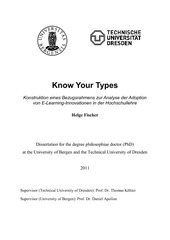| dc.description.abstract | The integration of e-learning innovations is the current challenge for organizations in Higher Education in order to support learning, teaching and administrative processes. Due to changing student needs, increased competition between organizations, different political and economic conditions as well as new pedagogical and technological approaches in Higher Education, institutions need to implement e-learning to generate additional educational and economic values. However, this requires an organizationwide usage of e-learning technologies in all departments, institutes etc. Indeed the use of technology within institutions of Higher Education varies a lot. While some teachers have been using e-learning technologies for many years continuously, others still reject all types of technological innovations. E-learning services (e.g. incentives, training, communication, support, participation etc.) should help to create conductive conditions in organizations, and increase the use of e-learning innovations in academic teaching and learning. Yet e-learning services are only effective if they meet the requirements and needs of academic staff. However, the conceptual foundations for the design of target group-oriented e-learning services have not been laid so far. Therefore, accompanying e-learning services are often designed according to the "one size fits all" approach, and implemented without consideration of individual and / or group-specific characteristics of potential users. The aim of the PhD thesis “Know Your Types! Konstruktion eines Bezugsrahmens zur Analyse der Adoption von E-Learning-Innovationen in der Hochschullehre.” is to investigate the question: How can the use of e-learning innovations in Higher Education be promoted from the perspective of academic teaching staff? The focus of investigation is on members of academic staff as potential e-learning users. Thus, the conceptual foundations have been created to accompany the introduction of e-learning innovations in Higher Education by target group-specific e-learning services. Therefore on the one hand, the process of e-learning adoption has been analyzed in detail, and on the other hand, e-learning adopters among the academic teaching staff have been examined empirically. The conceptual core of this research project is a frame of reference for e-learning adoption. It shows the structure of the adoption process as well as the influence of external factors. Based on theory-driven exploration, the frame of reference is created gradually and then expanded by the findings of an empirical study. The theoretical basis for the construction of the frame of reference is the adoption theory, which analyzes from the perspective of individuals, how and why people adopt innovations. Moreover, concepts from practice theories, motivation theories and organization theories have been incorporated in the development of the frame of reference. Adopter characteristics have been analyzed by an online survey among teaching staff members (n = 175) in institutions of Higher Educations in Saxony, a state in the southeastern part of Germany. By using multivariate methods of data analysis (factor analysis, cluster analysis), four types of e-learning adopters with regards to their motivation, needs and attitudes towards e-learning innovations have been identified and characterized: typ 1 – explorers, typ 2 – research-oriented adopters, typ 3 – teaching-oriented adopters and typ 4 – networkers. Each of these adopter types could be addressed and assisted individually through target group-specific e-learning services during the introduction of e-learning innovations. The result of the research process is a frame of reference which describes the adoption behaviour of academic staff members and delivers heuristics for the design of target group-specific e-learning services. By using these results in practice, e-learning innovation can be introduced more effectively and efficiently at institutions of Higher Education. | en_US |
